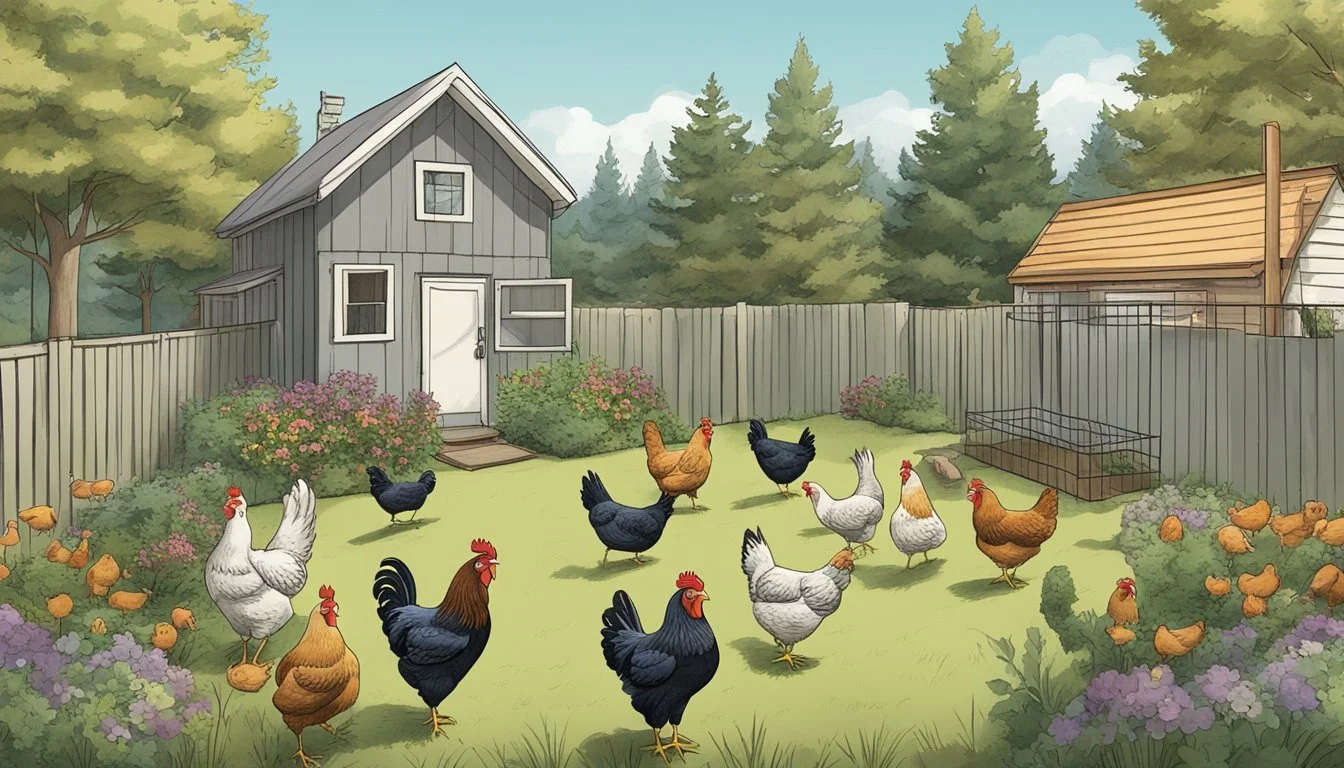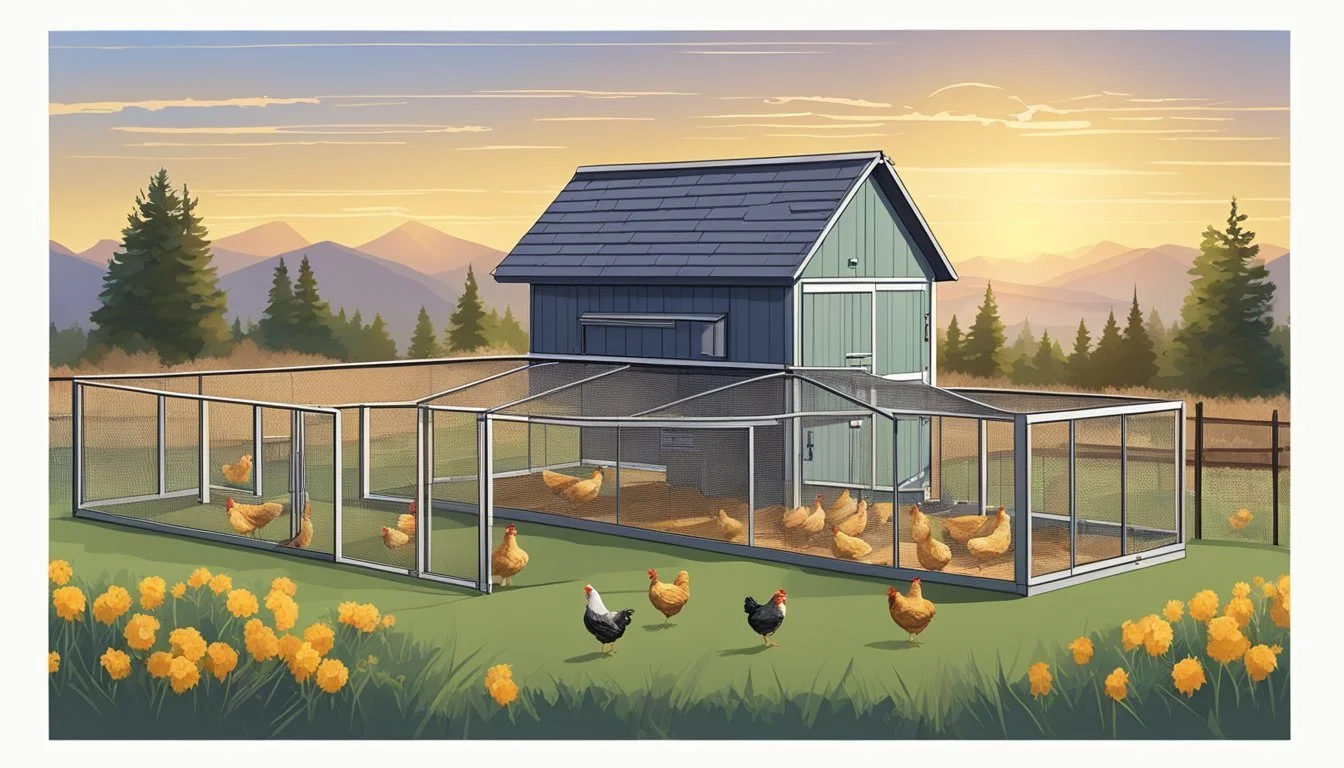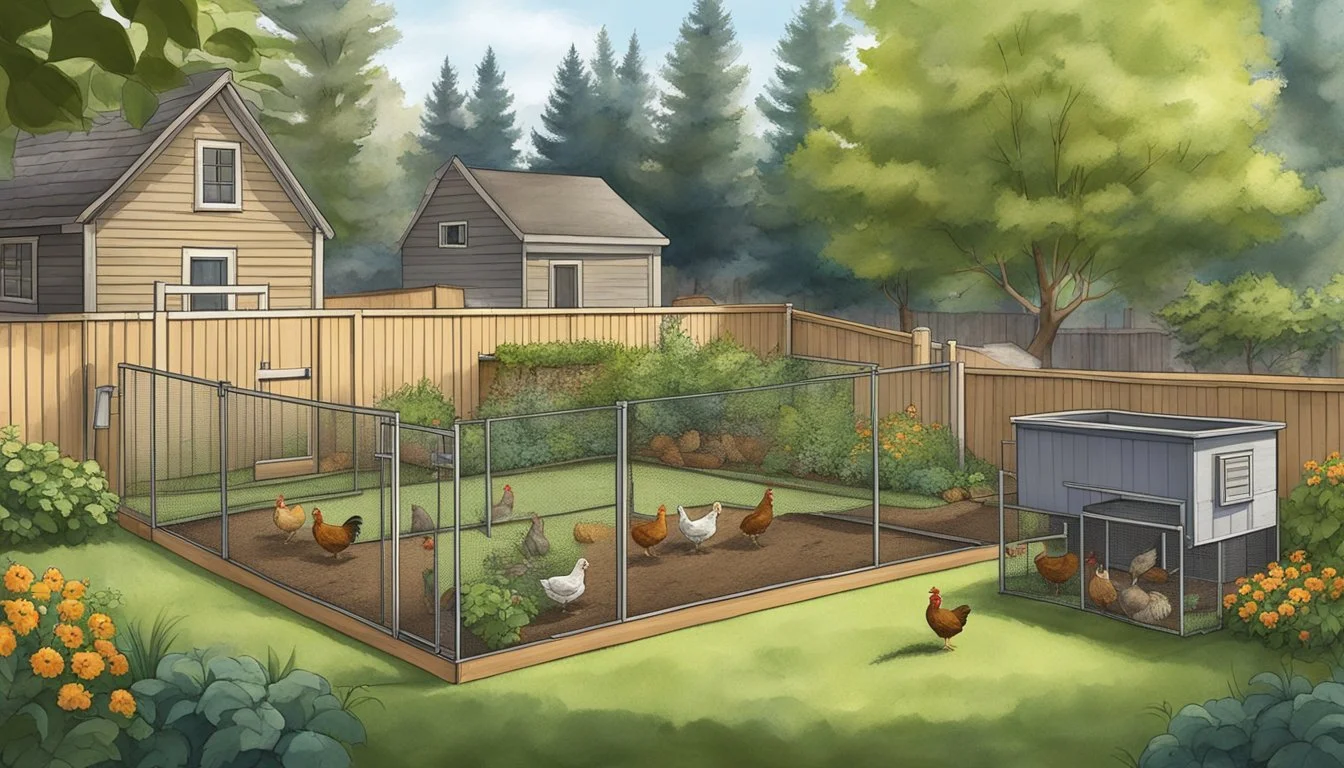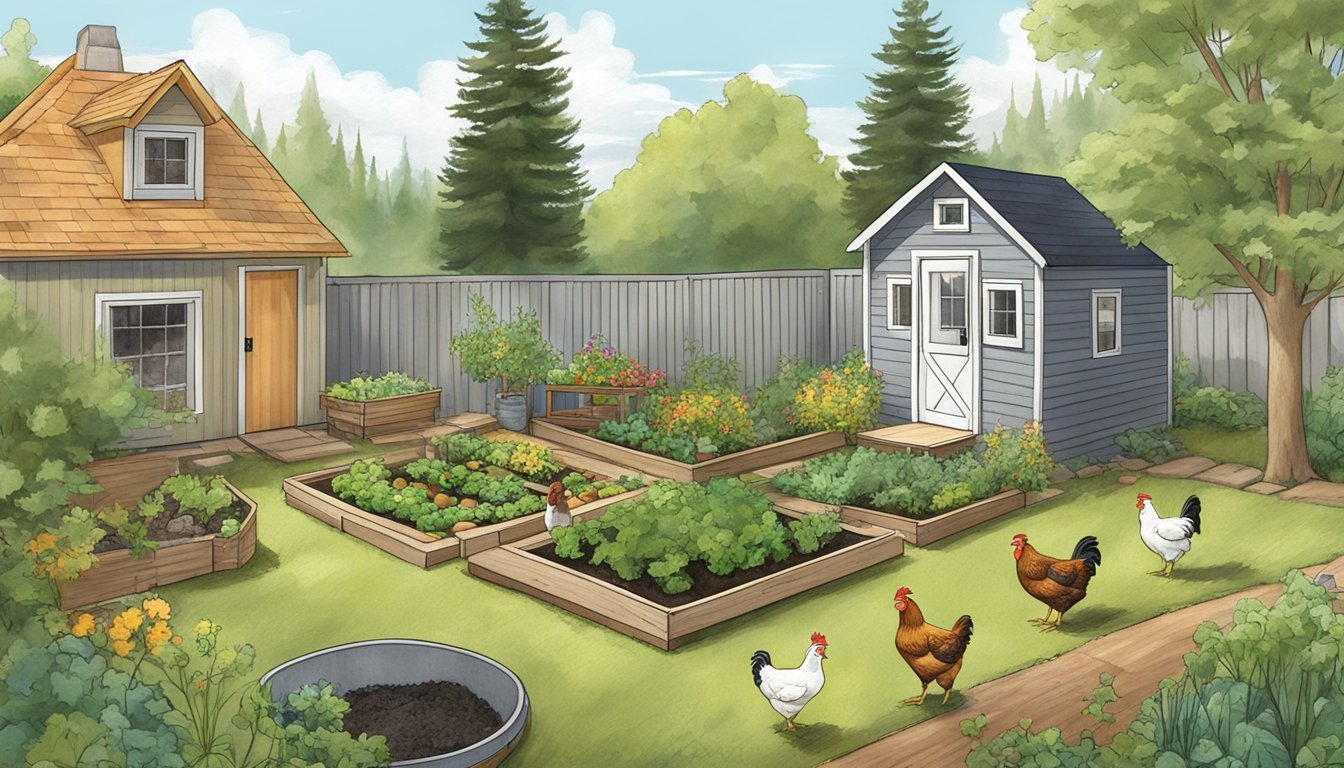Keeping Backyard Chickens in Spokane, WA
Essential Tips for Urban Poultry Farming
Backyard chickens have become an increasingly popular choice for residents in Spokane, Washington looking to embrace a more sustainable lifestyle and to enjoy the benefits of fresh eggs daily. Spokane’s city ordinance allows the keeping of small domestic animals, including chickens, in various residential zones. This is permissible as long as zoning regulations are followed, which are designed to balance the interests of urban farming enthusiasts with the need to maintain order and sanitation within city limits.
Residents of Spokane living in RA, RSF, RTF, RMF, and RHD zones are allowed to keep chickens, laying out a comfortable premise for city dwellers who want to indulge in poultry rearing. The rules are set with clarity, specifying the numbers allowed and the spaces required. For instance, regulations define the number of chickens one can keep in relation to the lot size of their property.
The rise of urban chicken keeping aligns with Spokane County's growing acceptance of backyard poultry, solidified by changes in county codes to accommodate this hobby. These modifications reflect a recognition of residents' desires to cultivate personal food sources and the joy of animal husbandry, while still upholding community standards. Owners must remain mindful of their chicken coops, ensuring they are not only compliant with local ordinances but also that their flock does not disrupt the neighborhood.
Understanding Local Chicken Laws
In Spokane, Washington, keeping backyard chickens is regulated by local ordinances which address zoning, permits, and lot size requirements. It's essential for residents to review and adhere to these regulations to ensure compliance.
Spokane Municipal Code
The Spokane Municipal Code stipulates in its ordinance that the keeping of small domestic animals, including chickens, is allowed by right in several residential zones. These zones include Residential Agriculture (RA), Residential Single Family (RSF), Residential Two Family (RTF), Residential Multi-Family (RMF), and Residential High-Density (RHD) areas.
Permit and Fee Requirements
Spokane does not generally require permits for keeping chickens in residential areas, allowing residents to engage in the practice without additional bureaucracy or fees. However, they must maintain adherence to other regulations related to zoning and lot size.
Restrictions in Spokane Valley
Residents in Spokane Valley must be aware of specific zoning regulations and code compliance. Though permits are not required, other restrictions regarding proximity, sanitation, noise, and additional zoning rules must be considered to ensure neighborhood harmony and public health.
Residential Zones and Lot Size Regulations
In the residential zones where chickens are permitted, property size can dictate the number of chickens allowed. For instance, the Spokane zoning code may allow one bird per 2000 square feet of lot area. The recent changes in the county code have also made it possible for more residents to raise chickens by easing restrictions in low-density residential zones.
Essentials of Chicken Coop Design
Designing an effective chicken coop requires careful consideration of location, size, cleanliness, protection, and comfort for the chickens. Coops should serve as shelter and a place for chickens to lay eggs with considerations for animal enclosure setbacks.
Coop Location and Size
Choosing an optimal location for a chicken coop in Spokane is crucial. It needs to be close enough to the house for ease of access yet far enough to maintain sanitary conditions. The coop should provide at least 1 square foot per chicken and comply with any local regulations regarding animal enclosure setbacks.
Sanitation and Maintenance
Sanitation is paramount in a chicken coop to prevent disease and pests. Easy-to-clean surfaces, adequate ventilation, and regular removal of waste are essential. To maintain a sanitary environment, owners should include features such as removable droppings trays and provide tools for proper coop cleaning.
Protection from Predators
Protecting chickens from predators is vital. Coops must be built with sturdy materials and close securely. Fencing should be buried to prevent digging predators, and the coop should be reinforced with hardware cloth rather than chicken wire to increase security. Overhead cover is also recommended to safeguard against aerial predators.
Nesting Boxes and Roosting Spaces
Each coop should have nest boxes for laying eggs, with a standard being one box for every three to four hens. Nest boxes must be kept clean and filled with bedding. Roosting spaces are equally important, providing chickens a place to sleep off the ground. Roosts should be positioned higher than the nest boxes to align with chickens’ natural instincts.
Daily Care and Management
Proper daily care and management of backyard chickens in Spokane, WA, is crucial to ensure they remain healthy and productive. Adequate feeding, diligent health monitoring, and regular waste management are key components of daily chicken care that contribute to a thriving backyard flock and fresh eggs.
Feeding and Watering
Chickens require a balanced diet to stay healthy and produce high-quality eggs. They should have continuous access to poultry feed, which is specially formulated to provide all the necessary nutrients. Grain mixtures, along with kitchen scraps like vegetables and fruits, can supplement their diet but should not replace their regular feed.
Water: Chickens must always have access to clean water. Waterers should be checked daily to ensure they are full and free from contaminants. In colder weather, owners must ensure water does not freeze.
Keeping Chickens Healthy
A healthy chicken is a productive chicken. Regular checks for signs of disease or distress are important. Common symptoms to look out for include changes in eating habits, lethargy, and abnormal droppings. Chickens also require periodic vaccinations and parasite control treatments to prevent common illnesses.
Cleanliness: Coops should be kept clean as buildup of droppings can lead to disease. A clean coop also helps in preventing the attraction of pests that can harm the chickens or spread disease.
Managing Waste
Efficient waste management is essential in maintaining a clean and healthy environment for backyard chickens. Their droppings can be nutrient-rich, making excellent compost material for gardens.
Regular Clean-Up Routine: Coops should be cleaned regularly, with a deep clean performed periodically. Bedding should be replaced to control odor and reduce the risk of disease. Waste should be disposed of properly or composted away from the living area to prevent the spread of bacteria.
By adhering to these management practices, owners can provide proper care for their chickens, resulting in a sustainable source of fresh eggs and the joy of raising these animals.
Community Considerations
When keeping backyard chickens in Spokane, WA, it is crucial to address the impact on neighbors and the community, focusing on relations and appropriate management practices.
Neighbor Relations
Individuals planning to keep hens must consider their neighbors. Close communication helps address concerns such as property boundaries and bird visibility from neighboring yards. In urban and suburban areas of Spokane, cooperative engagement is key to maintaining good relationships. It is important for chicken keepers to ensure their flocks do not intrude upon neighbor's spaces or cause undue disruption.
Property Boundaries: Clear and respectful conversations about where coops and chickens will roam can prevent disputes.
Noise and Odor Management
Chickens can produce noise and odors that affect the surrounding community. Effective noise and odor management is critical, especially in densely populated neighborhoods.
Noise Concerns:
Spokane regulations typically prohibit roosters due to their loud crowing, which can be disruptive in residential areas.
Hen sounds are generally less disruptive, but measures should be taken to minimize noise at early morning or late evening hours.
Odor Concerns:
Regular cleaning of chicken coops and enclosures to prevent offensive odors from affecting neighbors.
It is advisable to maintain a routine waste management system that limits odor and keeps the yard sanitary.
Proactive management of these issues demonstrates a commitment to being a considerate member of the Spokane community and ensures the well-being of backyard chickens and the satisfaction of neighbors.
Legal and Ethical Responsibilities
When keeping backyard chickens in Spokane, WA, residents have legal obligations and ethical responsibilities to adhere to city and county regulations. They must ensure the well-being of the animals while complying with area-specific ordinances.
Ownership Limitations
In Spokane, the number of chickens allowed is regulated. Residents in various zones, such as RA, RSF, RTF, RMF, and RHD or any zone permitting dwelling units, can keep small domestic animals, including chickens, outright. Each property can house 1 chicken per 1,000 square feet of lot area, focusing on maintaining low-density and minimizing potential nuisances.
Animal Welfare Standards
Individuals are expected to meet specific animal welfare standards. Chickens must be kept in a safe, clean, and habitable environment, providing adequate space, food, water, and shelter. Proper care must be taken to keep the chickens harmless and healthy, reinforcing Spokane's commitment to ethical treatment of backyard livestock.
Liabilities and Compliance
Residents must comply with setback requirements for chicken coops to ensure safety and minimize disturbances to neighbors. Compliance with these regulations is essential to avoid potential liabilities, including fines or revocation of the permit to keep chickens if the standards applicable are not met. A license might be required for certain numbers or types of chickens, following careful review by SCRAPS, the enforcement entity.
Additional Aspects of Urban Chicken Farming
This section delves into the finer details of raising backyard chickens in Spokane, WA, highlighting the practical benefits and environmental considerations of urban chicken farming within the constraints of local regulations.
Benefits of Raising Backyard Chickens
Individuals who engage in the practice of raising backyard chickens reap a host of benefits. Primarily, fresh eggs are a significant perk. These eggs are known for their superior taste and nutritional content compared to store-bought alternatives. Besides the palpable quality of the produce, backyard chickens can contribute to sustainable living practices. They provide natural pest control, reduce food waste by consuming kitchen scraps, and produce manure that can be used to enrich garden soil.
Environmental Impact and Sustainability
Urban farming, specifically raising chickens, should be approached with consideration of its environmental impact. In Spokane, regulations permit one chicken per 1,000 square feet of lot area, up to a reasonable limit, encouraging a sustainable approach to animal husbandry. This regulation prevents overcrowding and promotes the health and well-being of the chickens. Additionally, well-managed chickens in urban settings contribute to sustainability by producing eggs locally, reducing transportation costs and associated emissions typically involved in commercial egg production. It's essential for prospective and current chicken owners to understand that the goal is not just compliance with restrictions but fostering a responsible and environmentally conscious approach to urban agriculture.








